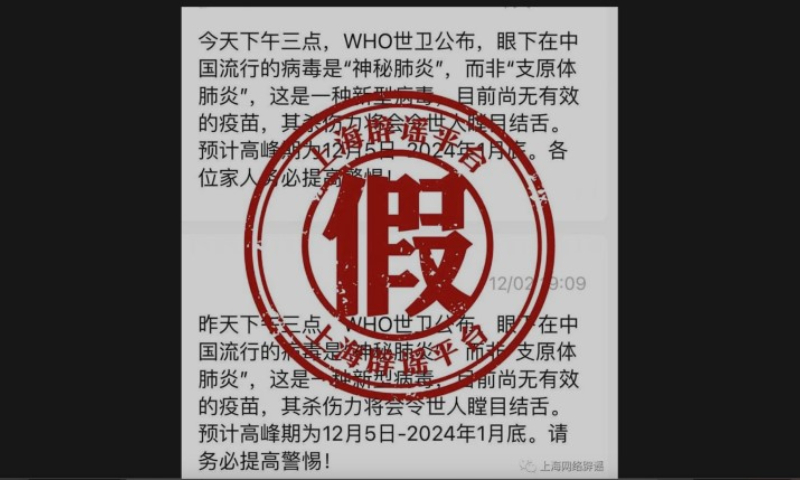
Photo: Web
Shanghai's official rumor-debunking platform refuted on Monday a recent rumor which claimed that "the World Health Organization [WHO] announced that the prevalent virus in China was a certain kind of 'mysterious pneumonia.'" The WHO has never issued such a conclusion, the platform stated after verification.
China's National Health Commission (NHC) introduced the prevention and control over respiratory diseases at the press conferences on November 24 and 26, and on Saturday, noting that according to monitoring, current prevalent acute respiratory diseases are all caused by already-known pathogens with corresponding mature treatment methods, and no new infectious diseases caused by new viruses or bacteria have been discovered.
The rumor-debunking platform searched the official website, Sina Weibo account and WeChat account of the WHO and found no information related to "mysterious pneumonia."
According to the rumor-debunking platform, Hu Qiangqiang, a spokesperson of the NHC, said on November 24 that Chinese health experts from the NHC, the Chinese Center for Disease Control and Prevention (China CDC) and the National Children's Medical Center held a video conference on technical exchanges of respiratory infectious diseases with the experts from WHO on November 23.
Chinese health experts provided an overview of the current prevalence of respiratory infectious diseases, pathogen monitoring, clinical diagnosis and treatment, and health education in China. Currently, the reported cases in China are all attributed to infection with already known prevalent pathogens.
During a press briefing on Saturday, Mi Feng, a spokesperson for the NHC, stated that the currently prevalent acute respiratory diseases are caused by already known pathogens, and corresponding mature treatment methods are available based on monitoring. No new viruses or bacteria causing newly emerging infectious diseases have been identified.
Wang Dayan, director of the China National Influenza Center, National Institute for Viral Disease Control and Prevention, China CDC, said the monitoring results indicate that the influenza virus is sensitive to several antiviral drugs, which means that these drugs are effective against the influenza virus.
The rumor-debunking platform discovered that numerous We-media accounts were spreading misinformation about the WHO, quoting out of context and overgeneralizing specific cases. These accounts misinterpreted official WHO statements and omitted information released by China's NHC.
Based on netizens' comments and messages, it cannot be ruled out that some We-media accounts intentionally spread rumors to create panic and generate traffic by taking advantage of the public's attention to the diseases.
Global Times




